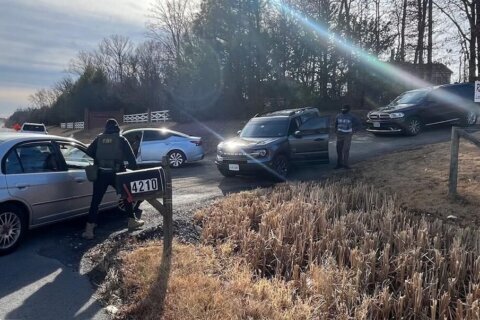This article was republished with permission from WTOP’s news partner InsideNoVa.com. Sign up for InsideNoVa.com’s free email subscription today.
This article was written by WTOP’s news partner InsideNoVa.com and republished with permission. Sign up for InsideNoVa.com’s free email subscription today.
OmniRide will offer its first commuter service into the D.C. area since bus operators went on strike three weeks ago, but enough drivers remain out of work that both commuter and local service remain severely limited.
Starting Tuesday afternoon, OmniRide resumed limited service between the Horner Road commuter lot and Pentagon thanks to what the agency called “increased manpower,” but other commuter routes are still indefinitely suspended due to the Teamsters Local 639 strike.
According to Keolis and OmniRide Director Bob Schneider, enough operators have remained at work throughout the strike to allow for local buses to run every 90 minutes, but a contract agreement between the union and Keolis – the private company that operates OmniRide service – remains out of reach and many bus drivers remain on strike.
On weekday mornings, OmniRide will run nine northbound shuttles from the Horner Road lot between 4:45 and 9 a.m. 10 southbound shuttles from Pentagon back to Horner Road will run between 2:15 p.m. and 8 p.m. In announcing the schedule, OmniRide said it “will continue to reinstate service incrementally, as manpower permits.” Throughout the work stoppage, paratransit has continued to run.
With negotiations on a new collective bargaining agreement ongoing, Teamsters Local 639 announced the strike Feb. 14, citing a need for better pay, less time to reach the top pay levels and better retirement benefits.
“We’re not working for nothing no more,” Local 639 Treasury-Secretary Bill Davis said at the time. “… We’re looking for a liveable wage that has a pathway to a top-scale wage. And right now, they’re offering a decade to get a decent wage, and we’re just not going to agree to that.”
Statements from both sides at last week’s meeting of the Potomac and Rappahannock Transportation Commission — the governing body that funds OmniRide — indicated that the union and Keolis have gotten closer to a deal in recent weeks. But the negotiations for how long it takes operators to reach the top pay levels has been a major sticking point.
According to Keolis, pay raises for all employees – up to 26% for some – have been offered, along with a plan to condense what’s been a 16-year pay scale to nine years in year one of the contract and six years by the fourth. Mike Ake, Keolis’ regional vice president, told the commission that doing so would be “horrendously expensive” but necessary to stay competitive in the increasingly tight market for commercial driver’s license (CDL) holders.
According to Ake, the two sides had “reached agreement on about 84% of the articles in the collective bargaining agreement.” But in order to afford the pay increases, Keolis says it has to maintain a two-tiered pay scale, with one tier for its commuter bus drivers and another for its local route drivers.
Ake said that kind of bifurcation is an industry standard, but a Teamsters representative told the commission during public comment that they couldn’t agree to the two-tiered scale.
“A CDL operator is a CDL operator. They all go to school. They all learn how to drive the bus … The only thing different is where they’re driving the bus, and until we get that straightened out, we’ll never come to an agreement,” John Estes, Local 639 business agent and negotiator, said at the meeting.
As of last week, OmniRide Director Bob Schneider said that about 35 employees were continuing to report to work with more returning “bit by bit.” With the strike ongoing, OmniRide is also in the process of finalizing its upcoming fiscal 2024 budget. The Potomac and Rappahannock Transportation Commission board approved a fiscal 2024 budget that includes the last $10 million left of its federal COVID-19 relief money. The budget also relies on a fare increase for commuter service from $6.90 to $9 and a more than doubled local subsidy of $21 million total from fuels tax collected by Prince William, Stafford and Spotsylvania counties as well as the cities of Manassas, Manassas Park and Fredericksburg.
“In FY2023, we reduced local share of the budget to $10.5M (20 percent) using recovery funds, which is why the increase this year is significant,” OmniRide’s staff report on the budget says.
In considering their own budgets, some local officials have already expressed concern about the local subsidy increase for the commission, which will likely only grow once all of the agency’s relief funds have run out. According to Schneider, the Potomac and Rappahannock Transportation Commission and OmniRide have simply given Keolis a funding number to work with. Otherwise, the negotiations on a new collective bargaining agreement have exclusively taken place between Keolis and the union.
For the first time since the pandemic, OmiRide’s express service had topped 4,000 average daily riders from May to December last year, reaching a post-COVID peak of 4,411 average daily riders in September. Last November saw the agency’s post-COVID high mark for local service ridership at 2,384 average daily riders.
Last week, one commuter bus rider from Prince William told the commission that since Feb. 15, she’d lost two hours of sleep per night and her commute had increased by three hours every day. She blamed the commission board for not doing more to prevent the strike.
“I am tired, I am financially drained, and I am angry,” she said. “… It is evident that this work stoppage has been allowed to occur. This board and Keolis had 10 and a half months to prevent this disaster for Northern Virginia citizens. You knew 10 and a half months ago that this collective bargaining agreement was an issue.”
Meanwhile, in Loudoun, Keolis operators for Loudoun County Transit have been on strike since Jan. 11. Leaders from Amalgamated Transit Union Local 689, the employees union there, have called for the county to penalize Keolis, but Loudoun County officials have maintained they can’t fine the company, telling the Loudoun Times-Mirror that they believe neither ATU Local 689 nor Keolis have acted in bad faith.
Last week, Estes, the negotiator for Teamsters Local 639, offered an apology to riders who’d been impacted by the service disruptions in Prince William County.
“It’s not good for me, the union. It’s not good for [PRTC]. It’s not good for the commuters or anybody else involved,” he said. “We feel like we’re getting close to a deal.”
Prince William County Supervisor and Potomac and Rappahannock Transportation Commission board member Margaret Franklin said that while the board was not involved in the negotiations, she wanted to see an agreement reached soon.
“I want this resolved as quickly as possible. Our commuters need to get back to work,” she said. “So whatever you all need to do that is reasonable and rational on both sides, that’s what we need to do.”







